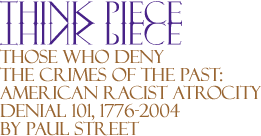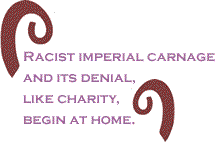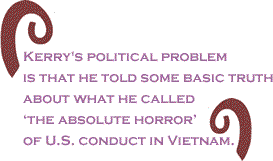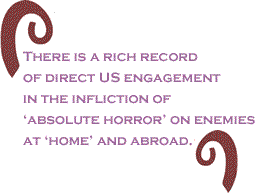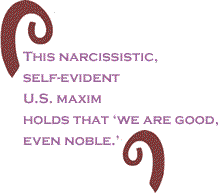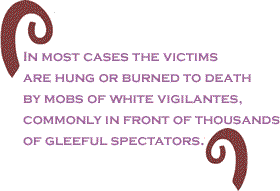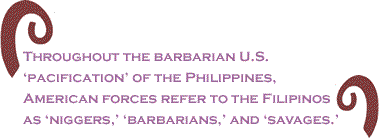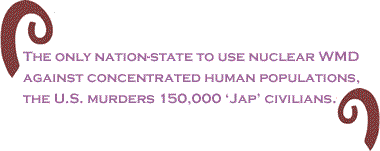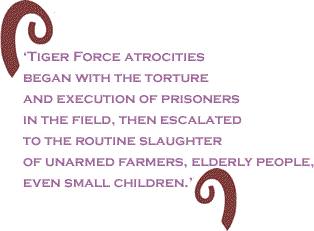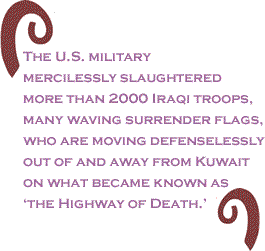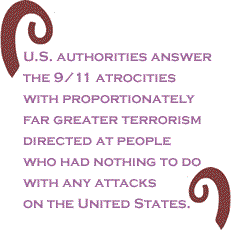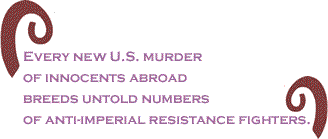
|
|||||||||||||||||||||
|
The U.S. Marines stood by and did nothing while the library at the Aristide Foundation was burned. With my own eyes I saw the American Marines stand and watch while rebels cut a woman and shot her. I yelled at them, “Do something!” and they swung their guns around toward me and yelled, “Get back!” While I hid in a field the American Marines put their hats on the bodies of dead people and posed for pictures with them. It made me sick because in Haiti we respect the dead. The Americans scare me; I don’t believe that they want anything good for the Haitian people because they support the criminals who oppose democracy.
Americans are clearly faced with a choice. On the one hand, they can continue in their collective pretense that "the opposite of everything is true," prattling on about "innocent Americans" being "the most peaceful people on earth" while endorsing the continuous U.S. disposition of death, destruction, and domination in every quarter of the globe. On the other, they must at last commence the process of facing up both to the realities of their national history and to the responsibilities that history has bequeathed. In effect, Americans will either become active parts of the solution to what they and their country have wrought, or they will remain equally active parts of the problem. There is no third option.
John Kerry Haunted by the Youthful Admission of "Absolute Horror"
There are many indications that the United States is nowhere near ready to repudiate imperial arrogance, racism, and criminality so that it might join or help create a real world community. One such indication is the brazen chutzpah with which it has restored fascist thugs to power in Haiti, standing by while U.S.-friendly henchmen butcher supporters of a president that American military personnel kidnapped “back to Africa” because he was too closely aligned for American corporate tastes to the nation’s millions of desperately impoverished citizens. If one of those citizens is to be believed, and his eyewitness testimony (see the quote from “Johnny” above) is richly consistent with a long record of U.S. military conduct (see below), some U.S. Marines are posing for souvenir photographs with murdered victims of Haiti’s new death squads. Another depressing sign is the United States’ failure to include Arab victims in its ongoing presidential candidate "debate" over the wisdom and morality of George W. Bush's illegal invasion and occupation of Iraq. At the height of his anti-war campaign for the Democratic nomination, Howard Dean said that "there are now almost 400 people dead who wouldn't be dead if we hadn't gone to war" (New York Times, November 4, 2003), ignoring careful investigations showing that more than 7800 Iraqi civilian non-combatants died during the invasion.
Another among many warnings along the same discouraging lines is the sad fact that Democratic presidential candidate John Kerry can be put on the defensive because of some minimally honest testimony he gave to the Senate Foreign Relations Committee more than thirty years ago. The candidate's political problem is that he told some basic truth about what he called "the absolute horror" of U.S. conduct in Vietnam after two tours of "duty" in Southeast Asia. Kerry's "old words have come back to haunt him," the New York Times reported two weeks ago, as "conservative" supporters of "President" Bush "question whether Mr. Kerry is 'a proud war hero or an angry antiwar protester.'" The young Kerry's 1971 testimony noted that American military personnel there had "raped, cut off ears, cut off heads, taped wires from portable telephones to human genitals and turned up the power, cut off limbs, blown up bodies, randomly shot at civilians, razed villages in a fashion reminiscent of Genghis Kahn, shot cattle and dogs for fun, poisoned food stocks and generally ravaged the countryside of South Vietnam." According to the Times, Kerry's words "remain a special lightning rod...especially" because he described military atrocities in Vietnam as "'not isolated incidents but crimes committed on a day-to-day basis with the full awareness of officers at all levels of command.'" (Kerry's 1971 testimony, quoted in Todd S. Purdum, "In '71 Antiwar Words, a Complex View of Kerry," New York Times, February 28, 2004, A1) A Nation of Exceptional "Kindness and Good Will"
In uttering these accurate words, Kerry violated two related principles of dominant US doctrine and culture. The first principle holds that the real tragedy of the Vietnam War is all about the trauma it inflicted on America, not Vietnam – a small peasant nation that lost millions of lives to US invasion. Seen (or not seen) through the filters of America's "mainstream" (really corporate-state) news and entertainment culture, however, Vietnam's difficulties are nothing compared to the pain that "pre-modern" state inflicted on the world's most powerful nation by committing the unpardonable "sin of self-defense," to use one of Noam Chomsky's sardonic characterizations. The second principle is a timeworn United States dictum that is "often," in Chomsky words, "considered unnecessary to formulate because its truth is taken to be so obvious." This narcissistic, self-evident U.S. maxim holds that, in Chomsky apt paraphrase, "we [the U.S] – or at least the circles who provide the leadership and advise" the makers of US policy – "are good, even noble. Hence our interventions are necessarily righteous in intent, if occasionally clumsy in execution. In [former US President (1912-1918) Woodrow] Wilson's own words, we have 'elevated ideals' and are dedicated to 'stability and righteousness,' and it is only natural, then , as Wilson wrote in justifying the conquest of the Philippines, that 'our interests must march forward, altruists though we are.'" (Chomsky, Hegemony or Survival: America's Quest for Global Dominance, 2003, pp. 42-43).
In a similar vein, Bush's "Mission Accomplished" speech to U.S. troops on the USS Abraham Lincoln last May claimed that "American values and America interests lead in the same direction: ...human liberty." America is unique, Bush the Second claimed, in the benevolence of its global power. "When Iraqi civilians looked into the faces of our servicemen and women," Bush claimed, "they saw strength and kindness and goodwill" on the part of armed forces that "achieve military objectives without directing violence against civilians" and use force only "as a last resort" ("President Bush Announces Major Combat Operations in Iraq Have Ended," May 1, 2003). In these and other examples, Bush II's orations are often monuments to the depth and degree of the "national self-love" (to borrow a phrase from Frederick Engels) that statesmen are capable of proclaiming. The Noble "Determination to Kill Every Native in Sight": A Brief Chronology of Direct U.S. Atrocities One of the many difficulties with the Wilson-Bush II way of seeing the US role in the world is the United States' long record of inflicting massive, elite-approved military mayhem on noncombatants at home and abroad. Below, I provide a partial and selective chronology of some of the better-known U.S. atrocities. This record places the carnage hinted at by the youthful Kerry in chilling historical context, helping us grasp the full extent of the United States' exceptional commitment to "kindness and goodwill" at home and abroad. In reviewing these terrible episodes, it is important to remember that the US prefers whenever possible for atrocities to be carried out quietly and impersonally – the US-imposed sanctions on Iraq (which silently killed more than half million Iraqi children) and the econoterrorist neoliberal mandates of the International Monetary Fund and the World Bank, for example – or indirectly, by non-American proxy forces like Pinochet's fascist butchers of the Chilean left (1973), the Central American death squads and contras of the 1970s, 1980s and 1990s, the mass-murderous Suharto regime in Indonesia (1965-2001), the racist occupation state in Israel, and the current gang of fascist thugs (whose leader expresses admiration for Pinochet) the US has just recently restored to client-state power in Haiti. Indirect and silent massacre is not always feasible, however, and there is thus a rich record of direct US engagement in the infliction of "absolute horror" on enemies at “home” and abroad, accompanied by a strong dose of racist rationalization. Here are some of the highlights: "The Winning of the West": A Great Work of Civilization By "The English-Speaking Race" 1776: Six thousand US troops raze more than 20 Cherokee towns, "destroying crops, inflicting serious casualties on noncombatants and sweeping much of the population into Spanish Florida. Only the cessation of about a third of the all Cherokee territory brings the annihilatory campaign to a halt" (Churchill, On the Justice of Roosting Chickens, p.44)
1800: American troops destroy a slave revolt in Virginia, executing Gabriel Prosser and 35 accomplices as a deterrent example to blacks that might seek freedom in the land of freedom. Already nearly two centuries old, North-American black chattel slavery will continue for six and half more decades, an ultra-racist social atrocity that some might consider as bad as physical eradication and which is followed by successive new regimes of anti-black racist oppression – Jim Crow segregation/apartheid, sharecropping and debt-peonage, urban ghettoization, mass incarceration, etc. – that embody the largely unacknowledged legacy and un-repaired burden of mass enslavement. Untold numbers of African-Americans will be murdered by white masters and overseers for various “reasons,” ranging from out-and-out rebellion to attempted escape, “disrespectful” behavior, and perceived insufficient work productivity. 1822: Troops hang 35 rebellious black slaves in South Carolina, leaving the rotting corpses on prolonged public display as a warning to other black chattel who might contemplate extending the principles of the Declaration of Independence to people of African ancestry. 1828-1840: U.S. Army conducts a long and bloody forced removal of the Cherokee, Choctaw, and Seminole nations to Oklahoma. 1831: Troops hang 19 rebellious slaves in Virginia. 1850: US troops massacre at least 75 Pomo Indians trapped on an island in the Russian River area of California. 1863: US Army Colonel Henry Sibley puts down a revolt of starving Santee Dakota Indians, conducting a mass execution of 38 native leaders. 1864: U.S. territorial military commander Colonel John Chivington oversees the quick and brutal murder of as many as 200 Cheyenne and Arapaho Indians at Sand Creek (Colorado). The Indians had been led to believe they had been given sanctuary at Sand Creek. More than half of the victims were women and children. 1868: Lieutenant George Armstrong Custer's Seventh U.S. Cavalry conducts a dawn assault on a noncombatant Cheyenne village camped along the Washita River in Oklahoma. Custer orders and oversees the slaughter of more than 100 Cheyenne, including women and children and the killing of 875 ponies. 1876-1877: The U.S. Army celebrates the 100th anniversary of American "freedom" and "goodwill" by launching a "Centennial Campaign" to clear the Black Hills of their original inhabitants. A winter campaign targeting mostly defenseless villages shreds away 90 percent of Lakota territory. Former Civil War hero and prolific Indian-killer General Phillip Sheridan proclaims that US Indian policy is one of "extermination," consistent with his pithy 1868 observation that "the only good Indian is a dead Indian." 1890/1899: The U.S. Seventh Cavalry massacres 350 unarmed Lakota - mainly women, children, and old men – at Wounded Knee creek in South Dakota. "The ostensible purpose," writes Churchill, "is to end the 'insubordination' embodied in the Indians' practice of the Ghost Dance. More likely, the troops [were] revenging themselves for the fate of Custer fourteen years earlier" (Churchill, On the Justice of Roosting Chickens, p.57) – when Lakota warriors committed the "sin of self-defense" by decimating Custer and his regiment at Little Bighorn. The Seventh Cavalry killers received Medals of Honor in recognition of their courageous actions. This and other genocidal anti-Indian atrocities that preceded it receive hearty approval in future US President and Spanish-American War instigator/hero Theodore Roosevelt's massive, four-volume 1899 study Winning of the West – a white-supremacist paean to Anglo-America's near- eradication of North America's original civilizations. "During the past three centuries," Roosevelt opined, "the spread of English-speaking people over the world's waste spaces" (meaning spaces not occupied by "progressive" capitalist-developmental Caucasians) was a great and welcome "feat of power," for which the "English-speaking race" could justly feel proud. No such "feat" of "race power" was more laudable, however, than "the vast movement by which this continent [North America] was conquered and peopled" – the "crowning and greatest achievement of a series of mighty movements." The Anglo-American pioneers conducted what Roosevelt called the noble civilizing "work" of "overcoming the original inhabitants" while at the same time "warding off the assaults of the kindred [that is European-Caucasian] nations that were bent on the same schemes." The North-American settlers performed the most heroic "work" of all, for they "confronted the most formidable savage foes ever encountered by colonists of European stock." Destroying the Indian "savages," Roosevelt claimed, was white North America's third greatest work to date, exceeded only by "the preservation of the Union itself and the emancipation of the blacks" – this as African-Americans suffered under terrorist Jim Crow regime in the former slave states and faced countless indignities throughout the U.S (Theodore Roosevelt, The Winning of the West, Volume I: From the Alleghenies to the Mississippi, 1769-1776 [New York, 1899], pp. 1-22). 1889-1918: 3,224 Americans are lynched within the United States, mostly in the South. Seventy-eight percent of these atrocity victims are black. In most cases the victims are hung or burned to death by mobs of white vigilantes, commonly in front of thousands of gleeful spectators. Many observes take pieces of the victim’s body as souvenirs to memorialize the event. Photographs of the murdered victims circulate as popular postcards throughout the South, providing precedent for the imperialist pornographic exercise observed by “Johnny” and noted at the beginning of this article. The Free-Fire Zoning of Asia and the Disciplining of Haiti by "The Children of the Anglo-Saxon Race"
1898-1905: The U.S. Army, frequently led by "old Indian fighters," seizes the Philippines from its prior colonial master (Spain) and crushes a Filipino independence movement, killing as many as 600,000 natives of the newly US-acquired Philippine islands. Few prisoners are taken and the Red Cross reports an extremely high ratio of dead to wounded, indicating U.S. "determination to kill every native in sight." Throughout the barbarian U.S. "pacification" of the Philippines, American forces refer to the Filipinos as "niggers," "barbarians," and "savages." America's racist and Social-Darwinist President (1901-08) Theodore Roosevelt vilifies resisting Filipinos as "Apaches." The phrase "gook" makes its first appearance as a U.S. military term to describe angry and frightened Asians who inhabit lands invaded by "freedom-loving" Americans. Custer's legendary U.S. Seventh Cavalry arrives to help suppress "gook Apaches" in 1905. The U.S. butchery receives indirect racist approval from leading U.S. financial authority and Wall Street journalist Charles A. Conant, who anticipates certain aspects of J.A. Hobson and V.I. Lenin's celebrated theories of imperialism (see Carl Parrini and Martin Sklar, “New Thinking About the Market: Some American Economists on Investment and the Theory of Surplus Capital,” Journal of Economic History [September 1983], pp. 559-578) in an essay titled "The Economic Basis of Imperialism." Beyond his argument that surplus domestic capital in core industrial states provides the taproot for modern U.S. and European imperialism, Conant claims that the US is entering a path of global expansion "marked out for them as children of the Anglo Saxon race." The new movement towards overseas imperialism is "the result," Conant argues, of "natural laws of economic and race development. The great civilized people have today at their command the means of developing the decadent nations of the world," who require benevolent Anglo-Saxon intervention because they are on the wrong side of the law of the "survival of the fittest" (Charles A. Conant, The United States in the Orient, New York, NY, 1900, p. 2)
1915-1934: Haiti lives under the supreme authority of the U.S. Marine Corps, which dissolves that formerly sovereign country’s National Assembly, restores practical slavery for much of the populace, turns the economy over to U.S. corporations, and massacres an untold number of Haitian peasants. During a “battle” at Fort Reviere, the Marines kill 51 Haitians and do not suffer a single casualty, helping U.S. Smedly D. Butler earn a Congressional Medal of Honor. Reports of U.S. military abuse and atrocity lead to an investigation by NAACP official James Weldon Johnson, who finds the charge of extreme cruelty by the North-American troops to be accurate (J. Damus, “Reparations,” National Black Law Students’ Association). This imperial butchery is encouraged by the rich and toxic racism of the supposedly great moral-idealist Woodrow Wilson administration, one of whose high diplomatic officials tells Wilson’s Secretary of State Robert Lansing that “Negro blood” keeps the Haitians “almost in a state of savagery and complete ignorance.” Lansing agrees, claiming that “the African race are devoid of any capacity for political organization” and “governance” and marked by “a tendency to revert to savagery and to cast aside the shackles of civilization which are irksome to their physical nature” (quoted in Noam Chomsky, World Orders Old and New (New York, 1996, p.44). August 1945: the US drops atomic bombs on Hiroshima and Nagasaki, fully aware that Japan was defeated and seeking surrender. These monumental crimes are perpetrated to demonstrate unassailable U.S. power to the world and especially to the Soviet Union in the post-WWII era. The only nation-state to use nuclear WMD against concentrated human populations, the U.S. murders 150,000 "Jap" civilians to make a threatening statement to the Russians and other people who might follow the Soviet example by developing their nations and societies outside the American-based world capitalist system. 1950: In one small incident in a broader war that killed perhaps 2 million Koreans, members of the legendary U.S. Seventh Cavalry murder hundreds of South Korean refugees – mostly women and children – at a railroad trestle near the village of No Gun Ri. According to the Pulitzer Prize-wining authors of a 2002 book recounting this previously buried U.S. atrocity, "some refugees were shot trying to climb back up the embankment to fetch food from abandoned bags. Some were shot when, desperately thirsty, they ventured outside for stream water." U.S. "mortarmen, machine-gunners, and riflemen blasted away" at trapped refugees "from their ragged holes on the dusty barren hillside, in the Seventh Cavalry's first big encounter with 'gooks' in Korea."
When they joined the Seventh, recruits were given a pamphlet telling them that their cavalry unit "firmly established their reputation as Indian fighters at the battle of Washita." This pamphlet "did not explain that the Seventh Cavalry, in the snowstorm at Washita, had slaughtered more than one hundred Native Americans – mostly unarmed old men, women, and children – who had been ordered into the area by the U.S. Army itself." (Charles Hanley, Sang-Hun Choe, and Martha Mendoza, The Bridge At No Gun Ri: A Hidden Nightmare From the Korean War, N.Y., 2002, pp. 17, 129-34). May to November 1967: As a small part of a broader U.S. invasion and occupation that killed millions of Vietnamese, an "elite" 45-man unit of the U.S. Army 101st Airborne Division known as "Tiger Force" conducts a murderous march through Vietnam's central highlands. A detailed and courageous four-part series published by The Toledo Blade in the fall of 2003 shows that "Tiger Force" killed an untold number – certainly well into the hundreds – of farmers, villagers, and prisoners. One medic interviewed by Blade reporters "said he counted 120 unarmed villagers killed in one month." According to left writer Mike Davis, who helped bring the Blade series to national light, "Tiger Force atrocities began with the torture and execution of prisoners in the field, then escalated to the routine slaughter of unarmed farmers, elderly people, even small children... Early on, Tiger Force began scalping its victims (the scalps were dangled from the ends of M-16s) and cutting off ears as souvenirs. One member – who would later behead an infant – wore the ears as a ghoulish necklace... A former Tiger Force sergeant told reporters that 'he killed so many civilians he lost count.'" A Tiger Force private remembers thinking that the killings were "wrong" but recalls that they were considered an "acceptable practice" for US military personnel in the central-highlands' many US-designated "free fire zones," where (by a former Tiger Force Lieutenant's account) "anything living...was subject to be eliminated." The slaughter was sponsored and protected by senior officers (including one who went by the name of "Ghost Rider" and named his battalions "Barbarians," "Cutthroats" and the like) and never resulted in prosecution of any of the perpetrators, despite an extensive Pentagon investigation that was buried by the White House in 1975. Asked why the Pentagon's post-atrocity investigation of Tiger Force never went anywhere, a leading senior office and massacre participant later recalls being summoned to the Pentagon and told that "there's wrongdoing there, and we know about it. But basically it's not...in the best interest of this, that and the other to try to pursue this." According to this officer, the investigation "was a hot potato. See this was after My Lai [see below] and the army certainly didn't want to go through the publicity thing." Former Watergate perpetrator and chief White House counsel (under Nixon) John Dean told the Blade that he was not surprised the investigation was dropped since "the government doesn't like ugly stories." Neither apparently does today's supposedly "left-leaning" mainstream press, which refuses to pick up and meaningfully disseminate the shocking Blade findings. The great "liberal" New York Times prefers months later to prattle on page one about the "controversial" nature of Kerry's 1971 testimony, leaving cutting-edge investigation into what really happened in Vietnam to a relatively small paper in the "conservative" Midwest. 1968: My Lai, the mother of all officially recognized modern U.S. atrocities: 347 unarmed Vietnam civilians, including 12 babies, are slaughtered in the hamlet at Song My by a company of the U.S. Army 23rd ("Americal") Division. While belated U.S. media attention focuses in 1969 and 1970 on the company's deranged commander (Lieutenant William Calley) and treats the incident as an anomaly within the broader benevolent (if occasionally “clumsy”) conduct of US policy, the massacre provides what Ward Churchill calls "a lens through which to examine the de-facto rules of engagement under which U.S. ground forces operated for nearly 7 years (1965-1972). "Known as the 'Dead Gook Rule' – that is, if a corpse is Vietnamese it is counted as a slain 'enemy combatant' on that basis alone – it points to a process of unremitting massacre, both large-scale and small, of the civilian population.... More than a score of such operations during the course of the U.S. 'commitment,' and this is not even to begin to count the toll taken by such routine measures as the declaration of whole swaths of the country to be 'free-fire zones,' in which anything that moved could be killed with impunity." (Churchill, pp. 140-141). Colonel Oran Henderson (who shares the duty of covering up the My Lai killings with an up-and-coming military bureaucrat named Colin Powell), noted in 1971 that "every unit of brigade size" that "served" in Vietnam "has its My Lai hidden someplace" (Howard Zinn, The Twentieth Century: A People's History, 1988, p.226). 1969: Future US Senator (D-Nebraska) and current president of New York City's New School University Bob Kerry joins other Navy SEALS in the massacre of a score of unarmed villagers, mainly women and children. He later says it's "pretty close to being right" to call this massacre "an atrocity." "We Annihilated That Target, Let's Move On:" Killing Innocent Arabs, Africans, and Afghanis, 1987-2004 1986: The U.S. bombs the Libyan cities of Tripoli and Benghazi, killing hundreds, including Libyan dictator Muamar al Quadaffi's infant daughter. There is no evidence for the White House's claim that Libyan agents had been involved in the earlier bombing of a German disco in which seven U.S. military personnel were killed.
1988: The U.S.S. Vincennes shoots down a clearly marked civilian Iranian airliner over the Persian Gulf, killing 290 civilians and possibly motivating Iran to become involved in the bombing of Pan Am flight 103 over Scotland. The ship's captain, who illegally crossed into Iran's territorial waters before shooting the defenseless commercial plane, later receives a "combat action ribbon" for this action. His "air warfare coordinator" even receives the Navy's Commendation Medal for "heroic actions" and "ability to maintain poise and confidence under fire." 1991: US forces kill as many as 250,000 Iraqis, including large numbers of noncombatants during "Operation Dessert Storm," ostensibly launched to punish its longstanding dictator-client Saddam Hussein for invading Kuwait, a neo-feudal U.S. oil protectorate – an action Saddam had reason to think the U.S. approved. The U.S. military mercilessly slaughtered more than 2000 Iraqi troops, many waving surrender flags, who are moving defenselessly out of and away from Kuwait on what became known as "the Highway of Death." Numerous war crimes are committed by US forces (including the dropping of cluster bombs in areas where civilians are present) in an onslaught that is absurdly excessive relative to the force required to drive Saddam out of Kuwait. The Jordanian Red Crescent society counts 120,000 civilian casualties. The White House initially encourages Iraqi Kurds and Shiites to rebel against Saddam but then permits the Iraqi dictator it supposedly reviles as a "butcher" to pitilessly slaughter his domestic opposition. 1998: The Bill Clinton White House orders the bombing of the only pharmaceutical plant in the deeply impoverished Sudan, killing thousands of bystanders and an untold number of others. There is no evidence for White House claims that the plant was manufacturing illegal weapons.
2001-2004: Thousands of innocent Afghans and Iraqis are killed by U.S. forces. Among other things, these murders reflect racist superpower payback for the jetliner attacks carried out on 9/11/01 by a small number of predominantly Saudi-Arabian Islamic extremists against innocent noncombatants at the World Trade Center and military personnel at the Pentagon. Resisting majority global sentiment insisting that the U.S. respect established global norms and procedures for responding, U.S. authorities answer the 9/11 atrocities with proportionately far greater terrorism directed at people who had nothing to do with any attacks on the United States. During one of many incidents where the US "mistakenly" murders innocent/noncombatant Iraqis in the spring of 2003, the Air Force blows up 18 ordinary civilians in a house thought to be sheltering Saddam Hussein. Left dead in the rubble is "Abdul M's" "entire family," including his daughter and his wife. "I dug them out," Abdul tells researchers a Public Broadcasting system "Frontline" documentary that appears in February 2004, "with my own bare hands. I carried them out with my own bare hands. I buried them with my own bare hands." "Emotionally," a U.S. officer involved in this glorious, freedom-loving act of imperial butchery notes, "it was, 'we annihilated that target, ok we did that, let's move on." Regarding butchered Iraqi soldiers, the "Frontline" documentary tells viewers that, "in the end, it was [Iraqi] street gangs versus [American] soldiers": poorly equipped Iraqi troops, including large numbers of teen conscripts, versus the most powerful military force in world history. "Operation Iraqi Freedom," it appears, was another "turkey shoot," to use Dessert Storm veterans' common description of the first George Bush's one-sided Iraqi "war," which ushered in a US-imposed sanctions regime that killed more than half a million Iraqi children, exacting a "price worth paying," in the immortal words of Clinton's Secretary of State Madeline Albright, who once claimed that that the United States "stands taller and sees farther than other nations." The White House and Pentagon justifies its imperial orgy in Iraq during 2003 with falsely concocted arguments about imminent WMD threats to the security of the United States – of increasing official prominence as the WMD threat claims are disproved – and America's supposed desire to export democracy to the Middle East. The American imperial state seizes upon 9/11 as a glorious opportunity to launch a permanent, open-ended "war on terrorism" and unfurl a long-planned doctrine of pre-emptive war and unilateral world domination that seeks among other things to tighten the US grip on pivotal Persian Gulf and South Asian petroleum and gas resources and demonstrated US capacity to rule the world on the basis of preponderant military force. By “the latest conservative estimate,” John Pilger notes, the bloody U.S.-British invasion has killed “between 21,000 and 55,000,” causing the “death every month of 1,000 children from cluster bombs” (John Pilger, interview by the Australian Broadcasting System, March 11, ZNet). Meanwhile the U.S. can’t develop the capacity to include Arab victims in its election arguments over “Operation Iraqi Freedom.” Dean makes the critical oversight (including 8000 dead Iraqi noncombatants) mentioned at the beginning of this article. In a pivotal anti-war address he makes to the Council on Foreign Relations in June 2003, the most outspokenly anti-war of the serious contenders renders Iraqi victims invisible, except – maybe – insofar as their suffering harms America's damaged "moral authority in the world." Dean proclaims his desire to restore that supposed "authority," which he identifies with president Harry Truman (1945-52), who ordered the two most barbarian acts in human history (the racist atom-bombings of Hiroshima and Nagasaki) and who grossly exaggerated the "Soviet threat" to launch a half-century campaign of hyper-militarization and racially disparate global devastation called "the Cold War." Those Who Fail to Acknowledge the Crimes of the Past... Seen against, and as part of, the vast historical canvass of U.S. racist-imperial slaughter, the monumental US crimes in Southeast Asia that John Kerry hinted at in his 1971 testimony are part of a larger story that renders self-delusional many Americans' notion that their nation-state is some sort of great exceptional moral and ethical city on a global hill. It is especially important to appreciate the significance of the vicious, often explicitly genocidal "homeland" assaults on native-Americans, which set foundational racist and national-narcissist patterns for subsequent U.S. global butchery, disproportionately directed at non-European people of color. The deletion of the real story of the so-called "battle of Washita" from the official Seventh Cavalry history given to the perpetrators of the No Gun Ri massacre is no small detail. Denial about Washita and Sand Creek (and so on) encouraged US savagery at Wounded Knee, the denial of which encouraged US savagery in the Philippines, the denial of which encouraged US savagery in Korea, the denial of which encouraged US savagery in Vietnam, the denial of which (and all before) has recently encouraged US savagery in Afghanistan and Iraq. It's a vicious circle of recurrent violence, well known to mental health practitioners who deal with countless victims of domestic violence living in the dark shadows of the imperial homeland's crippling, stunted, and itself-occupied social and political order.
Power-mad US forces deploying the latest genocidal war tools, some suggestively named after native tribes that white North American "pioneers" tried to wipe off the face of the earth (ie, "Apache," "Blackhawk," and "Comanche" helicopters) are walking in bloody footsteps that trace back across centuries, oceans, forests and plains to the leveled villages, shattered corpses, and stolen resources of those who Roosevelt acknowledged as America's "original inhabitants." Racist imperial carnage and its denial, like charity, begin at home. Those who deny the crimes of the past are likely to repeat their offenses in the future as long as they retain the means and motive to do so. It is folly, however, for any nation to think that it can stand above the judgments of history, uniquely free of terrible consequences for what Ward Churchill calls "imperial arrogance and criminality." Every new U.S. murder of innocents abroad breeds untold numbers of anti-imperial resistance fighters, ready to die and eager to use the latest available technologies and techniques to kill representatives – even just ordinary citizens – of what they see as an American Predator state. This along with much else will help precipitate an inevitable return of US power to the grounds of earth and history. As that fall accelerates, the U.S. will face a fateful choice, full of potentially grave or liberating consequences for the fate of humanity and the earth. It will accept its fall with relief and gratitude, asking for forgiveness, and making true reparation at home and abroad, consistent with an honest appraisal of what Churchill, himself of native-American ancestry, calls "the realities of [its] national history and the responsibilities that history has bequeathed": goodbye American Exceptionalism and Woodrow Wilson's guns. Or Americans and the world will face the likely alternative of permanent imperial war and the construction of an ever-more imposing U.S. fortress state, perpetuated by Orwellian denial and savage intentional historical ignorance. This savage barbarism of dialectically inseparable empire and inequality will be defended in the last wagon-train instance by missiles and bombs loaded with radioactive materials wrenched from lands once freely roamed by an immeasurably more civilized people than those who came to destroy. Paul Street ([email protected]) writes on imperialism, racism, and thought control. His book Empire and Inequality: Writings on America and the World Since 9/11 (Paradigm Publishers) will be released in the summer of 2004. |
March
18
2004 |
|||||||||
|
|||||||||
|
|
|||||||||
| Printer Friendly Version | |||||||||
 |
|||||||||
| |
|||||||||
| |
|||||||||





















